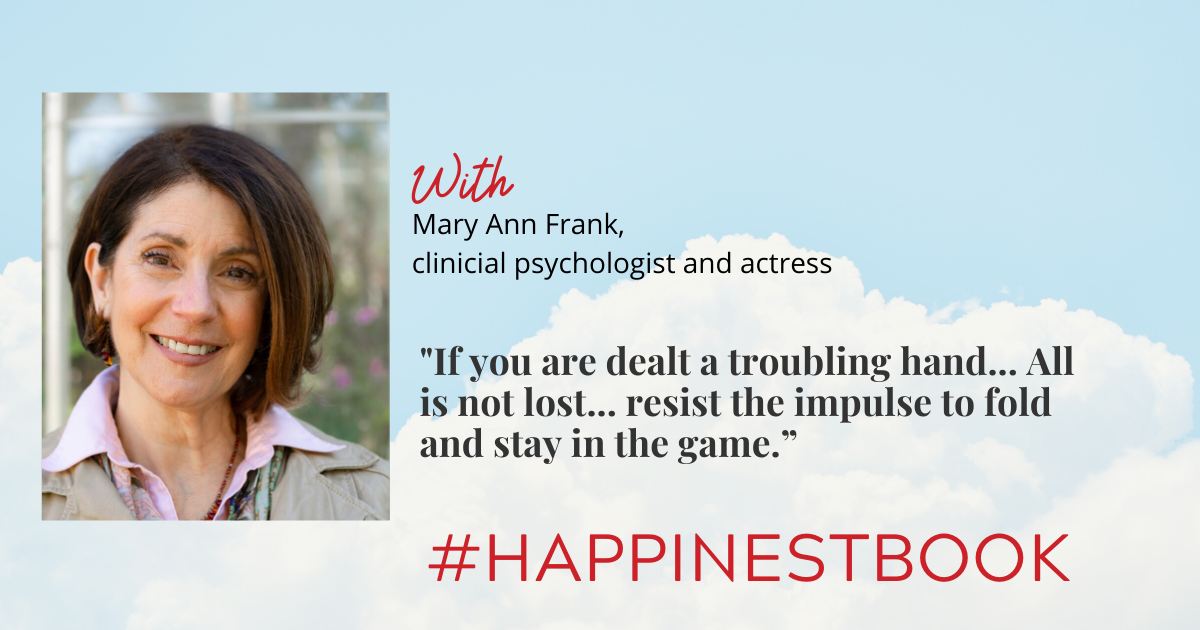When She Lost her Husband After Her Kids Left Home, Mary Ann Frank Launched Her One-Woman Play: ‘Spinning.’
Mary Ann Frank, a clinical psychologist in New Haven, had much more than the empty nest to cope with after her last child went to college. She also lost her husband of 28 years to a brain tumor, a glioblastoma. He was Ralph Hoffman, a professor of psychiatry at the Yale medical school and a renowned research scientist in schizophrenia. “Little did I know how empty the empty nest was going to become,” she says. Seeking to make sense of it, Mary Ann tapped her talents as a playwright, singer and actress and launched a one-woman musical memoir called “Spinning” in New Haven. She says we “spin” when our sense of the future is lost: “It’s like having vertigo.” As she worked through the trauma, she found—as people often do—new creativity and ambition. Mary Ann aims to share her play in regional theaters and has recorded the music from “Spinning,” which is about marriage, loss, resilience and transformation.
Did you like this episode? Please feel free to share it using the social media buttons below. I’d also be VERY grateful if you could rate, review, and subscribe to HappiNest on Apple Podcast, Spotify, Stitcher or Google Play.
What you’ll learn about in this episode:
- Reaching into your past to find activities you love can bring transcendence and sustain you through turmoil. When her husband was diagnosed with a glioblastoma, which she compares to a “wrecking ball,” Mary Ann wrote “Spinning,” a one-woman musical memoir. “You are on the edge of a cliff looking down and not able to get your bearings.”
- She suffered depression and trauma, finding herself unable to remember the lyrics of songs, including Happy Birthday.
- One of her toughest challenges was dealing with the knowledge that “he would ultimately succumb to his illness and I would live after him.”
- Ralph saw a living room performance of the show at the home of friends. She told him, “I made you immortal.” He said, “It’s about time.”
- But Mary Ann says losing Ralph after her kids left home left her with “a bigger set of skills than I ever imagined.” She managed his medical care and learned to be an advocate and a better leader. She transferred those skills to working with others on her play. She notes that the empty nest is “just one curve ball that life throws at us.”
- Mary Ann recommends that you “push up to the limits of your comfort zone a little bit every day and give yourself credit for it. It doesn’t have to be huge.”
- She says people “tend to be very quick to criticize what they are not doing and slow to recognize the tiny steps they are taking to rebuild and reformulate their life.” She says one of her “superpowers” as a psychotherapist is that she can see the tiny steps people are taking and give them credit.
- Mary Ann recommends that you “stop skating on the surface,” and engage your creativity. She refers to that as “using yourself up.”
- During a tough transition, give yourself time to adjust, and as your curiosity returns, find what “feeds you,” Mary Ann says.
- If you are dealt a troubling hand, you can build “skill and resilience by understanding that there are multiple ways to play the game, even if you don’t have a choice about the cards in your hand, and are pissed off at the dealer,” Mary Ann says. “When the bad hand is dealt, of course, the first reaction might be that all is lost. But it’s not. The important thing is to resist the impulse to fold and stay in the game.”





